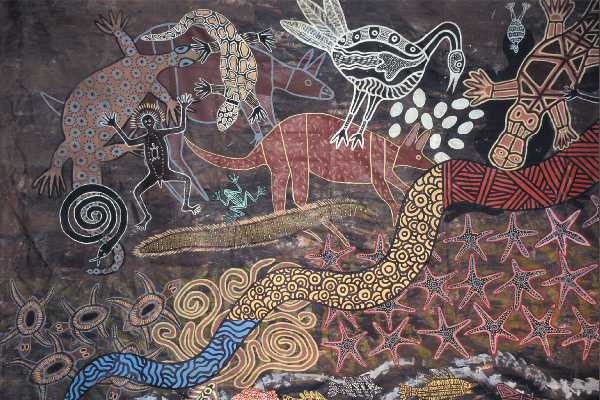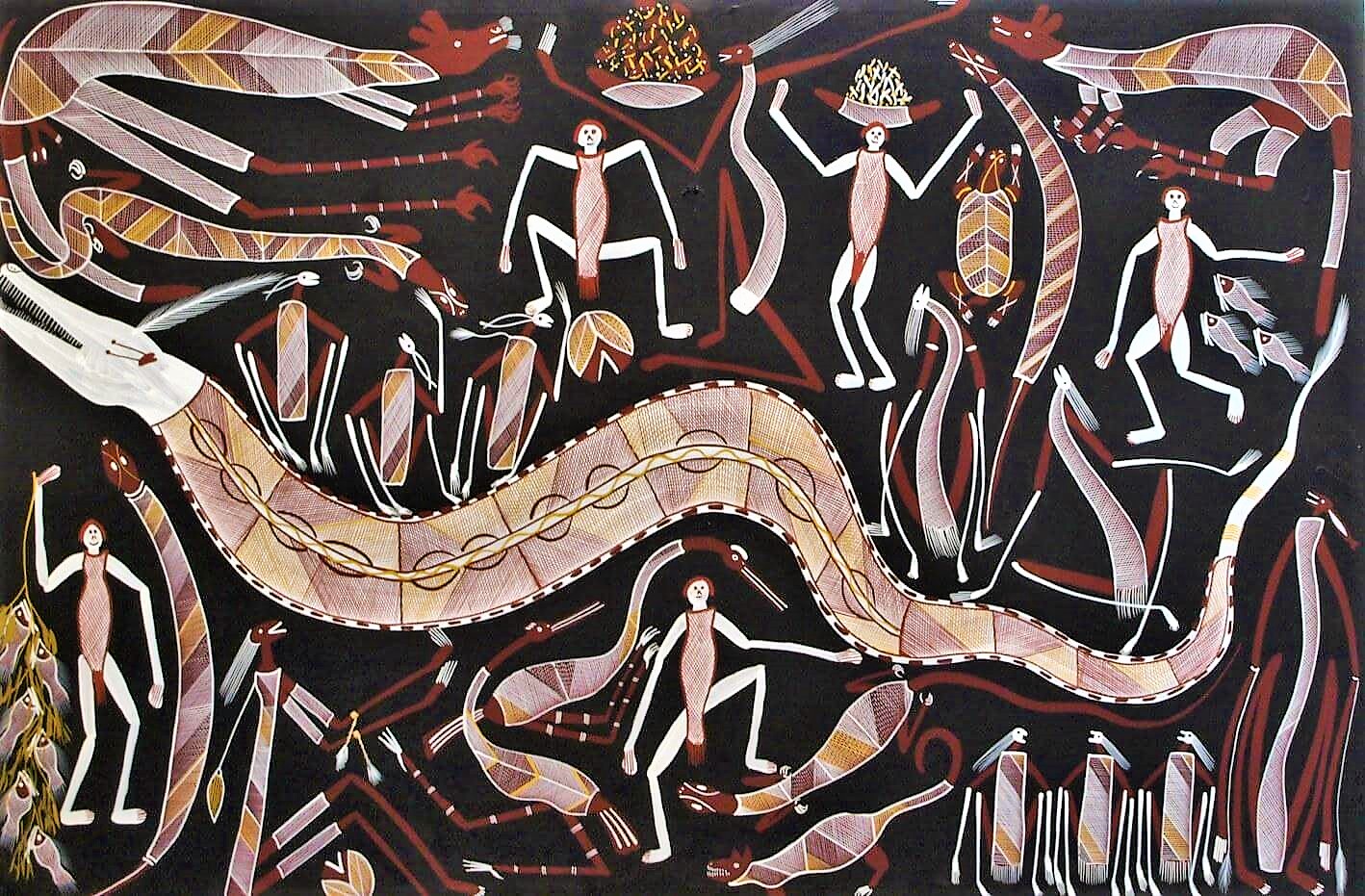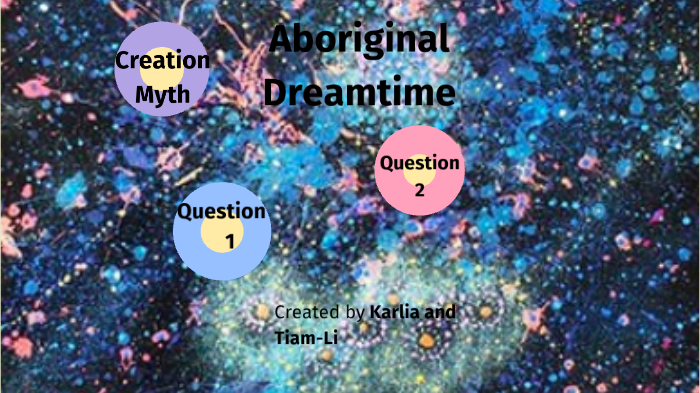The Dreamtime and Māori Mythology: A Comparative Exploration
The Dreamtime and Māori Mythology: A Comparative Exploration

The concept of "Dreamtime" is deeply embedded in Aboriginal Australian culture, serving as a foundational element of their beliefs, stories, and understanding of the world. It represents a primordial state of creation, where ancestral beings shaped the landscape and established the laws of nature. However, while Māori mythology shares some similarities with Aboriginal Australian mythology, it lacks a direct equivalent to the Dreamtime. This begs the question: Does Māori mythology contain a concept similar to the Dreamtime?
To answer this question, we must delve into the core tenets of Māori mythology and compare them to the Aboriginal Australian Dreamtime.
Related Articles: The Dreamtime and Māori Mythology: A Comparative Exploration
- Uniting The Spirit Of The Land: Exploring The Diverse Tribal Roots Of The Australian Aboriginal Cricket Team
- Unlocking The Meaning: A Comprehensive Guide To Aboriginal Names
- The #ERROR! Enigma: Understanding And Troubleshooting Excel Errors
- A Tapestry Woven Through Time: A Testament To The Resilience Of A Culture That Has Survived Through Centuries
- Sacred Hill: A Journey Through Time And Culture In Australia
Understanding the Māori Worldview
Māori mythology is a rich tapestry of stories, songs, and rituals that reflect their deep connection to the natural world. At its core lies the belief in "Te Ao Mārama", the world of light, and "Te Ao Pō", the world of darkness. Te Ao Mārama is the world we inhabit, while Te Ao Pō is the realm of spirits, ancestors, and the unseen.
The Role of Gods and Ancestors
Māori mythology is populated by a pantheon of gods and goddesses, known as "atua". These atua are not all-powerful deities in the Western sense but rather powerful beings who embody specific aspects of nature or human characteristics. For example, Tane Mahuta is the god of forests and birds, Rongo is the god of cultivated food, and Tangaroa is the god of the sea.
Alongside these atua are the "tupuna", the ancestors who are revered as powerful figures who shaped the land and established the social and cultural norms of the Māori people. Their stories are often intertwined with the origins of specific places, plants, animals, and even human beings.
The Creation Myth of Māori
The creation myth of Māori is a complex and multifaceted narrative that involves multiple gods and ancestors. The central figure in this myth is "Rangi", the sky father, and "Papa", the earth mother. Their union resulted in the birth of many children, including the gods mentioned earlier.
The children of Rangi and Papa eventually rebelled against their parents, separating them to create the world as we know it. This act of separation is seen as a crucial moment in Māori creation mythology, representing the emergence of light and order from darkness and chaos.

The Concept of "Te Kore"
While Māori mythology does not have a direct equivalent to the Dreamtime, it does contain a concept that shares some similarities: "Te Kore". Te Kore is often described as a state of nothingness, a void that existed before the creation of the world. It is a realm of potential, a place where the seeds of all things are contained.
Te Kore is not a specific place or time but rather a state of being, a concept that resonates with the Aboriginal Australian idea of the Dreamtime as a primordial state of creation. However, Te Kore is not as fully developed as the Dreamtime, and it does not play the same central role in Māori mythology.
Comparing Māori and Aboriginal Australian Mythology
While both Māori and Aboriginal Australian mythologies share a strong emphasis on the ancestral beings who shaped the world, there are significant differences in their approach to creation and the relationship between humans and the spiritual realm.

The Aboriginal Australian Dreamtime is a timeless and universal concept that permeates all aspects of their culture. It is a foundational narrative that explains the origins of the world, the laws of nature, and the social and cultural structures of their society. The Dreamtime is also a living force, a spiritual connection that links the present generation to the ancestors and the future.
Māori mythology, on the other hand, is more focused on the specific actions and relationships of individual gods and ancestors. While the creation myth is important, it is not as all-encompassing as the Dreamtime. Māori mythology emphasizes the interconnectedness of the natural world and the importance of respecting the spirits and ancestors who inhabit it.
The Absence of a Direct Equivalent to the Dreamtime
The lack of a direct equivalent to the Dreamtime in Māori mythology is likely due to several factors:
- Different cultural contexts: Māori and Aboriginal Australian cultures developed in distinct geographical and environmental settings, leading to different perspectives on the world and its origins.
- Different historical experiences: Māori and Aboriginal Australian cultures have experienced different histories of colonization and cultural change, which have shaped their beliefs and practices.
- Different linguistic structures: The Māori language does not have a single word that directly translates to "Dreamtime," suggesting a different conceptual framework for understanding the relationship between the physical and spiritual realms.

Conclusion
While Māori mythology does not contain a concept identical to the Dreamtime, it shares some similarities with the Aboriginal Australian worldview. The concept of Te Kore, the state of nothingness before creation, resonates with the primordial state of the Dreamtime. However, Te Kore is not as fully developed or central to Māori mythology as the Dreamtime is to Aboriginal Australian culture.
The differences between Māori and Aboriginal Australian mythology highlight the diversity of Indigenous cultures and their unique ways of understanding the world. While both cultures share a deep respect for the natural world and the spirits that inhabit it, their specific beliefs and practices reflect their distinct cultural contexts and historical experiences.
FAQ
Q: What are the key differences between Māori and Aboriginal Australian mythology?
A: While both cultures share a strong emphasis on the ancestral beings who shaped the world, Māori mythology is more focused on the specific actions and relationships of individual gods and ancestors, while Aboriginal Australian mythology is more all-encompassing, with the Dreamtime serving as a foundational narrative for all aspects of their culture.
Q: What is the significance of Te Kore in Māori mythology?
A: Te Kore is a concept that represents a state of nothingness, a void that existed before the creation of the world. It is a realm of potential, a place where the seeds of all things are contained.
Q: Does Māori mythology have a concept of a spiritual realm?
A: Yes, Māori mythology recognizes a spiritual realm called "Te Ao Pō," the world of darkness, which is inhabited by spirits, ancestors, and the unseen.
Q: How is the concept of "atua" different from Western deities?
A: Atua are not all-powerful deities in the Western sense but rather powerful beings who embody specific aspects of nature or human characteristics. They are not necessarily benevolent or malevolent, but rather represent the forces of nature and the human condition.
Q: What are some examples of Māori creation stories?
A: Some examples of Māori creation stories include the separation of Rangi and Papa, the creation of the islands of New Zealand by the demigod Maui, and the origin of the first human beings.
Q: How does Māori mythology influence contemporary Māori culture?
A: Māori mythology continues to be an important source of inspiration and identity for contemporary Māori people. It is reflected in their art, music, language, and social customs. Māori mythology also provides a framework for understanding the relationship between humans and the natural world and the importance of respecting the spirits and ancestors who inhabit it.
Closure
Thus, we hope this article has provided valuable insights into The Dreamtime and Māori Mythology: A Comparative Exploration. We hope you find this article informative and beneficial. See you in our next article!


